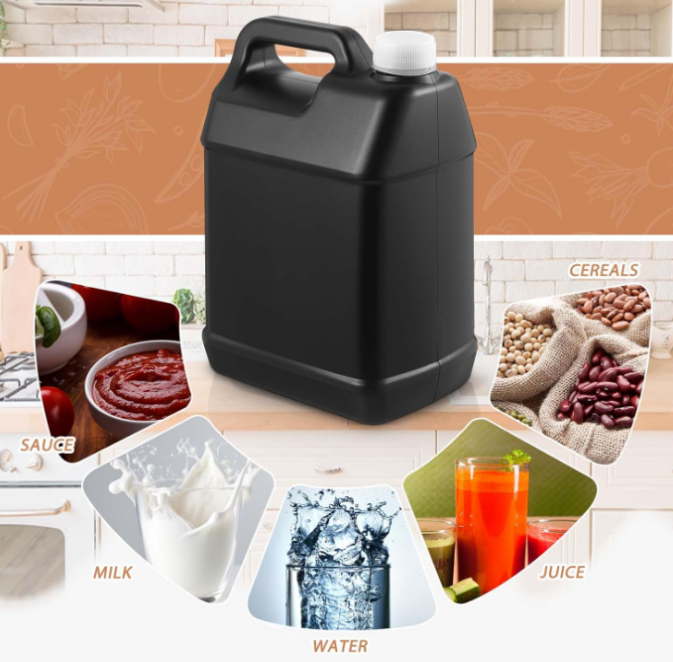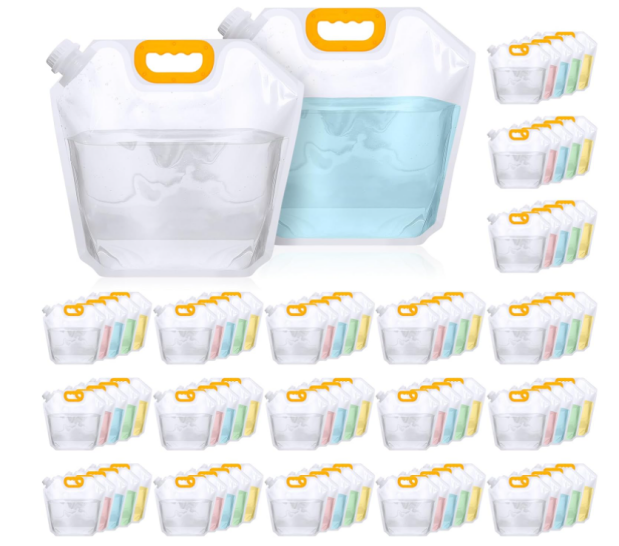Ultimate PK of Plastic Gallon Jug: Which Material and Type are Most Suitable for your Needs?
Are you looking for reliable and economical packaging for your juice, cooking oil, or chemical products? Plastic gallon pots have become the preferred choice in many industries due to their durability, lightweight, and high cost-effectiveness.
But have you ever thought that the design and material of a pot can directly affect the freshness, brand image, and even environmental impact of the product? As a packaging solution expert, MTPAK helps you gain insight into the intricacies of plastic gallon pots and make more professional choices.
The ultimate comparison of plastic gallon jug materials: which one comes out on top?
HDPE (High-Density Polyethylene): This is the most commonly used material, appearing opaque or semi-transparent milky white. It has excellent impact resistance and chemical resistance, and can effectively prevent moisture. It is suitable for milk, water, juice, lubricants, and cleaning agents. Usually recyclable, recycling code # 2.
PP (polypropylene): With outstanding high-temperature resistance, it can be used for microwave heating or high-temperature filling, and is commonly used in syrup, food, and certain special chemicals. Recyclable, recycling code # 5.
PET (Polyethylene terephthalate): usually in a transparent state, it has excellent transparency and gas barrier properties, especially in preventing oxygen penetration, which can better maintain the flavor and quality of the contents. It is commonly used in high-end fruit juices, edible oils, and beverages. Recyclable, recycling code # 1.
PCR (post-consumer recycled resin): Processed from recycled plastic products. The use of PCR material in gallon pots is a clear measure to demonstrate brand environmental responsibility and practice the circular economy.
How do different types of gallon jugs meet diverse application scenarios?
In addition to the material, structural design is also crucial:
Handle Design: A jug with an integrated handle greatly facilitates pouring and carrying, and is a standard feature for heavy liquid products (such as motor oil and detergent).
Neck Type: A standard threaded neck is compatible with a variety of bottle caps; a wide-mouth design facilitates filling and cleaning of viscous liquids (such as honey and paint); and a small-diameter spout facilitates controlled pouring.
Sealing Performance: Depending on your needs, the jug can be equipped with a standard screw cap, a sealing cap with an inner plug, or even a tamper-evident cap with a handle to ensure secure transport and prevent leaks.
Transparency: A fully transparent jug perfectly displays the contents; an opaque jug better protects light-sensitive products.
Anti-UV / Anti-static / Stackable, who is the "scene savior"?
Anti-UV gallon jugs: Some liquids, such as pesticides, lubricants, and some food ingredients, are sensitive to light. Prolonged exposure to sunlight can lead to deterioration, loss of efficacy, and even the production of harmful substances. UV-resistant gallon jugs, by adding UV-blocking agents or using dark, opaque materials such as black or dark green HDPE, effectively block a certain percentage of UV radiation, providing light-shielding protection for sensitive liquids.
Suitable Applications:
l Agriculture: Outdoor storage of pesticides, herbicides, and plant growth regulators to prevent light exposure that could reduce their efficacy or decompose their ingredients.
l Industrial: Storage of UV-sensitive lubricants, hydraulic fluids, and paints to prevent oxidation and caking.
l Food: Storage of edible oils, wines, and soy sauces that require protection from light (dark, UV-resistant jugs can reduce oil oxidation and extend shelf life).
Anti-static Gallon Jugs: In the chemical and electronics industries, static electricity can easily be generated by friction during the storage or pouring of liquids. If static electricity accumulates to a certain level, it can cause sparks, potentially causing flammable or explosive liquids like alcohol, gasoline, and solvent-based paints to ignite or explode, posing a significant safety hazard. Anti-static Gallon Jugs eliminate this risk in two ways: first, they use conductive materials, such as modified HDPE with added carbon powder, to quickly conduct static electricity to the ground; second, they feature an anti-static coating on the body to suppress static electricity.
Applicable Scenarios:
l Chemical Industry: Storage and transportation of flammable solvents such as ethanol, methanol, acetone, and banana oil;
l Electronics Industry: Storage of anti-static liquids for cleaning electronic components, or storage of specialized chemical reagents used in chip production.
l Auto Repair Industry: Packaging of gasoline, diesel, cleaning agents, and other flammable oils to prevent accidents caused by static electricity in repair shops.
Stackable gallon jugs: a space-optimizing tool for storage and transportation. In home storage, corporate warehouses, or during logistics transportation, ordinary gallon jugs, due to their irregular tops, are prone to tipping over when stacked, taking up a lot of space and resulting in inefficient storage. Stackable gallon jugs feature an optimized body structure—a grooved bottom and raised lid—that allows for precise interlocking and stable stacking (typically 3-5 layers). The flat sides also make them easy to place against walls or stack in multiple layers.
Suitable Applications:
l Home: Stacking can be used to store drinking water and cooking oil in kitchen storage, or laundry detergent and detergent on balconies to save vertical space.
l Commercial: Stacking can be used in supermarkets and convenience stores to store bottled beverages and daily necessities, improving shelf utilization.
l Industrial Warehousing: Factory warehouses store industrial raw materials and semi-finished products in bulk, reducing floor space and storage costs.
l Logistics and Transportation: Stacking gallon jugs in express and freight operations reduces sway and tipping during transportation, thereby minimizing breakage.
Conclusion
When choosing a plastic gallon jug, the key isn't to choose the most expensive or popular option, but rather the right material and type. HDPE is a safe bet for most applications, while PP is a better solution for high-temperature situations. Wide-mouth jugs are suitable for solids, narrow-mouth jugs for liquids, and jugs with spigots are ideal for frequent use. Using MTPAK's field measurements and comparisons, you can quickly identify the optimal solution and avoid trial and error.
If you are confused about the material and type of plastic gallon jug, you may want to contact MTPAK:
Email:account@mtpak.com
Contact us:https://mtpak.com/contact-mtpak
FAQ (Frequently Asked Questions)
Q1: Which is more environmentally friendly, HDPE or PET gallon jugs?
A: Both are recyclable. The choice depends on your product needs. From a lifecycle perspective, jugs made from recycled polymer (PCR), whether HDPE or PET, are more environmentally friendly than virgin ones.
Q2: How can I tell if the jug I receive is food-grade?
Please be sure to ask your supplier for a food contact declaration of conformity in accordance with FDA 21 CFR or EU 10/2011.
Q3: How can I determine if "UV protection" or "anti-static" is required for my application?
UV protection is required if the contents are sensitive to light, such as pesticides, cooking oil, or photosensitive chemicals, or if the product is stored outdoors or on a balcony.
Anti-static is required if the contents are flammable liquids, such as alcohol, solvents, or gasoline, or if the product is stored in a dry environment. If you are unsure, please provide the contents' characteristics to MTPAK, and their professional team will assist in making a decision.
Q4: Can we print our brand logo on the jug?
Of course. We offer a variety of decorative options, including screen printing, labeling, or in-mold labeling (IML). These vibrant, durable products effectively enhance your brand image.



